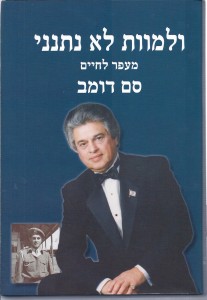Blog
Chapter 12 Part 1 – Lodz – Under the Aegus of the Relief Organizations
“Victory was to be bought so dear as to be almost indistinguishable from defeat.”
Winston Churchill, The World Crisis
Everything went well. The Russian officer stood by his word and saw to it that we got on the military train. This time we traveled with Father. Although she no longer bore the same heavy responsibility, Ita continued to maintain firm control over the situation; and Father, who had always known she was reliable, admired her performance. He was also very impressed with the level of our cooperation. Ita issued few instructions; a facial expression or simple hint was sufficient for everyone to understand their task. After four years of wandering, we had learned to obey her.
Each sibling knew what to carry and which place to occupy as we walked. Sara carried one bundle, Zipporah the other and I, of course, also had something small to carry. Our walking pattern was also clear. Ita was always in the rear, with me in front of her and Sara and Zipporah ahead of me, holding hands. Ita carried the heavy traveling sack and occasionally held my hand. I walked next to, or in front of her.
This system gave Ita full control of the group, allowing her to maintain constant eye contact with us. This is how we now walked to the train station in Kutaisi, although this time, Father carried the heavy bundle.
The train departed and we breathed a sigh of relief. The trip to Lodz was not short and it took many days to travel the almost 1,250-mile distance from Kutaisi. We had to get to Warsaw first and then board another train to Lodz. It stopped at many stations along the way and we had to change trains occasionally, sometimes being forced to wait several days until the next one arrived.
Read/Download PDF Chapter 12 Part 1
Read/Download PDF Chapter 12 in PDF Pages – as published in Jewish IMAGE Magazine To read chapter 12 Part 1 click the link below He_hath_not_let_me_die_ch_12_part_1
Chapter 11 – Georgia – Kutaisi
“All Jews are responsible for one another.”
Babylonian Talmud, Shavuot 39a
I felt the difference as soon as I entered the city. Laid out before our eyes was a city in its full glory, a beautiful and well-organized city. Aside from the military air field, which had been damaged in the German bombings, we saw no destroyed buildings; nor did we encounter the masses of refugees we had become accustomed to seeing. The city was vibrant and full of life.
The military trucks that had picked us up brought us to an army base outside the city, which apparently served as a Red Army military school and had spacious barracks and storerooms. Here we met other refugees who, like us, had arrived from various locations near the areas of fighting. The base seemed orderly and well set up.
We were welcomed by the city’s Jews, who provided us with food and clothing. One of the women, who knew the officer in charge, decided to help us. She took pity on us, four orphans dressed in rags, battered and exhausted, and asked the officer to house us in the base storeroom. The officer approved her request, but noted that he had no beds or mattresses for us.
“Don’t worry, I’ll take care of their needs. I thank you for your cooperation,” she said. Taking the initiative, our hostess went from one Jewish home to another collecting food, clothing, mattresses and blankets. She returned to the storeroom after a short while with the donated supplies.
Read/Download PDF Chapter 11
Read/Download PDF Chapter 11 in PDF Pages – as published in Jewish IMAGE Magazine To read chapter 11 click the link below He_hath_not_let_me_die_chapter_11




